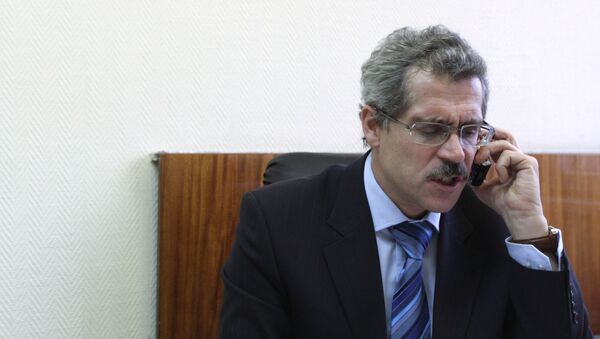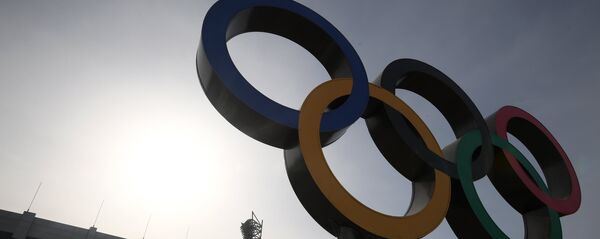‘The Evidence Is Not Transparent'
"The IOC's arguments and proofs are not transparent," Wieschemann underscored. According to the lawyer, the allegations of the main witness, Grigory Rodchenkov, are unreliable, and there are signs of self-interest and narcissism.
"No one can judge this decision. You can think all you want about the report itself, and about its conclusions. At least, all proofs are published in a way so that everyone can shape their own opinion about it," he said in the interview.
"Rather, there is some secret jurisprudence going on inside the IOC — both under Oswald's and Shmidt's leadership — because no one knows what evidence and proofs are implemented to base one or another decision. This is what I keep criticizing about this whole issue."
"The [IOC] decision making is not based on supremacy of law. At the end of the day, third persons have no way of understanding whether there is any proof against the former Minister of Sport [Mutko] or his aide or not. It is not immediately obvious from the McLaren reports, if we put Rodchenkov's testimony aside."
Better Use for the Money
Wieschemann pointed out that there is also a monetary penalty involved, and the IOC could have channeled this money to fight doping.
"I believe that if there were any true reason for penalty, [diverting money to a doping fight] would have been the best idea. In principle, we all are proponents of fighting doping. I am outraged, though, about the fact that these 15 million euros of penalty will go to the IOC, but not WADA or any other doping-fighting institution."
A ‘Fig Leaf' for Society
According to Wieschemann, the IOC's decision was forced by international sanctioning pressure against Russia.
"I have an impression that this decision was made primarily to send a signal by stripping Russia of its regalia — the flag and the anthem. On the other hand, they at least tried to treat the athletes in a fair way," he said.
"We've got to see if this decision to invite certain [clean] athletes is merely a ‘fig leaf' — because official qualification criteria simply do not exist. I have my doubts about this and I rather believe it is indeed a fig leaf for society. An excuse to say ‘no, we don't have anything against the athletes themselves.'"
"McLaren's report is a mystery: 82 percent of issues are about Summer Olympics and only 18 percent involve Winter Olympic Games, and that is only the beginning of it."
Rodchenkov Self-Interest
"I watched the ‘Icarus' documentary several times, with my family and my colleagues, I split it into episodes and analyzed each one separately. The most important part for me is that the idea that Rodchenkov left the country specifically to present his evidence to the world is nothing more than a myth. ‘Icarus' depicts a different story and it appears more plausible to me," he said.
"WADA has found Rodchenkov independently from Brian Vogel or from his own motivation — this has been stated in McLaren's report. And Rodchenkov was afraid of criminal prosecution in Russia."
"In other words, he came to the USA in the first place because of his own interest. Then New York district court issued him a subpoena, and only when he was preparing for this hearing with his attorney he got this idea of presenting his evidence as self-defense. The statement that he wanted to go whistleblowing from the very beginning is de-facto total nonsense," Wieschemann said.
But the Rodchenkov documentary revealed additional tidbits.
"Whoever saw the movie could see Rodchenkov saying all sorts of things, making incredible statements, so that even WADA was ready to pay to make him shut up — the viewers should take whatever Rodchenkov says with a large chunk of salt."
"I took advantage of that and talked with witnesses from all over the world. Many things point towards he presented information based on his own narcissistic aspirations. Those aspirations do not correlate to reality as other people see it."
Not Enough Evidence for Sanctions
Acting on behalf of Russian skiers Legkov and Belov, Wieschemann appealed to Arbitrary Sports Court (CAS) protesting a lifetime ban on their participation in the Olympic Games as well as voiding the athletes' prior achievements — stating there is no evidence for the decision.
"We have the CAS decision to temporarily ban the athletes from the Olympics, the one which FIS (International Skiing Federation) made on December 22 last year. At that time, CAS stated that the present evidence is not enough for sanctions, before May 15 hearings. According to CAS, the present evidence was enough for further investigation and temporary ban until October 31. That was not enough for sanctioning," he said.
"The situation did not change since then. On the contrary, some allegations that the court based its decision on found no confirmation. The IOC ignored that, as well as the fact that it was not me alone who stood up asking to clarify certain moments. That was ignored by everyone."
"We all were surprised that a long-announced intensive investigation was not conducted, and that, considering the unchanged facts of the case, a wrong decision was made," he added.
"I believe we have a good chance that CAS will stay true to the standards and I will point out that present evidence is not enough to apply sanctions to anyone.
Possible Measures
When asked about how Russia can counter the ban, Wieschemann noted that CAS artificially stretches the investigation so that a fair verdict becomes almost impossible, but he did not totally exclude the possibility.
"During the Olympics, a CAS ad-hoc panel is formed at the location 10 days before the beginning of the Games. It is possible to turn to it, and the Russian Olympic Committee will likely do exactly that."



